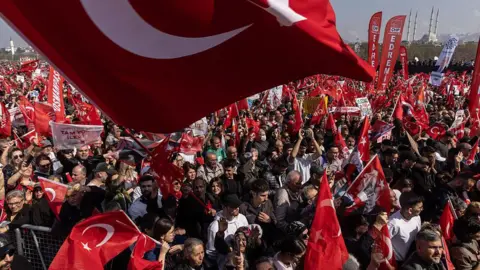'Don't Speak, Don't Film': Arrests of Journalists Ignite Concerns Over Democracy Following Turkish Protests

On the early morning of March 23, a moment of dread unfolded at the doorstep of Yasin Akgul, a 35-year-old photojournalist based in Istanbul. While his children were still asleep, police knocked on his door, armed with an arrest order that lacked any context or explanation. Akgul, who had just returned home from reporting on widespread anti-government protests, faced a new and terrifying reality: he had become a target. "I went to the door and saw there was a lot of police," he recounted. "They said they had an arrest order for me but gave me no details. My son was awake, and I couldn't even tell him what was happening as I didn't get it myself."
In his decade-long career with the AFP news agency, Akgul has covered a multitude of harrowing events, from the brutal civil war in Syria to the chaos in IS-controlled Iraq. However, nothing could prepare him for the chilling experience of being arrested in the safety of his own home. "A chill fell over the house," he said, reflecting on the fear that engulfed his family. "In my work, at the protests, I have seen a lot of violence and tear gas, but having the police in my home, I felt more afraid."
Akgul's arrest was not an isolated incident; he was among seven journalists apprehended during coordinated dawn raids, all of whom had been documenting protests ignited by the controversial arrest of Ekrem Imamoglu, the opposition mayor of Istanbul and a prominent challenger to Turkey's long-serving president, Recep Tayyip Erdogan. Imamoglu faces corruption charges that he vehemently denies, leading many to believe that his arrest is politically charged, an attempt to undermine his presidential ambitions.
Despite the authorities' ban on protests, citizens took to the streets in defiance, expressing their outrage at what they see as government overreach. Akgul is now facing allegations of participating in illegal rallies and marches, which he believes are aimed at dissuading others from documenting the unprecedented unrest unfolding in Turkey—a situation not witnessed in over a decade. He was in the midst of the chaos when he captured striking images that would be seen around the world, including one of a whirling dervish being forcibly subdued by riot police. These images not only highlight the tumultuous spirit of the protests but also foreshadow the crackdown on those who dare to document them.
"This message is to all the journalists," Akgul stated emphatically. "Don't shoot (take pictures), don't speak, don't film. They are making other journalists afraid that if they go back into the field, they could face the same thing." The implications of his arrest resonate deeply across the media landscape, particularly as he is associated with an international news agency. The chilling effect has already been felt, as many freelance journalists refrained from covering subsequent protests out of fear.
As Akgul spoke from his home, flanked by his wife, Hazal, and their children, the reality of his situation weighed heavily on them. "Plenty of my friends – fellow journalists – have already left Turkey because they faced charges or feared they would," he explained. The looming threat of legal repercussions has forced many media professionals to reconsider their safety, leaving an atmosphere of uncertainty and dread. Human rights organizations have echoed this sentiment, arguing that Turkish democracy is facing a grave erosion year after year.
The Turkish government, led by President Erdogan, who enjoys a dedicated support base, has increasingly tightened its grip on power. Erdogan has characterized the protests as "street terrorism," placing the blame on the opposition for instigating violence. He believes that the demonstrations will eventually dissipate, although public sentiment suggests otherwise.
While Akgul was released from custody on March 27, another journalist, Mark Lowen from the BBC, faced a different fate. After 17 hours in detention, he was deported from Turkey under the pretext of being a threat to public order. This incident, along with the arrest of Imamoglu's lawyer on dubious charges, underscores the perilous environment for journalists and legal representatives alike. Ece Guner, Imamoglu's lawyer and advisor, expressed grave concerns about the state of judicial independence in Turkey, stating, "The right to a defense, I think, is sacred. It's part of a fair trial that your lawyers should feel comfortable and safe."
In light of recent events, the question of where Turkish democracy stands remains pressing. Many fear that it now teeters on the brink of collapse. The Turkish interior ministry reported that around 2,000 people have been detained since protests erupted on March 19, a considerable number being students and young individuals who have only known Erdogan's rule. Such arrests serve as a stark warning to the youth: an unequivocal message to disengage from political discourse.
Emma Sinclair-Webb, the Turkey Director for Human Rights Watch, has observed a broader crackdown on civil society, expressing that the government is retaliating against any perceived dissent. "Public bodies are under threat," she warned, noting how those who voice their opinions face immediate repercussions. As the government continues its efforts to suppress dissent and render protests invisible, the control of media becomes paramount in shaping public perception.
The significant demonstrations that have unfolded recently have largely been absent from state-run media coverage, which has instead labeled protesters as terrorists. The latest rally, which attracted hundreds of thousands of people, has been claimed to have seen attendance surpassing two million according to opposition figures. Families spanning generations united under the sun to rally for change, despite the usual heavy police presence. Remarkably, this time the police refrained from deploying tear gas or rubber bullets, as the protest had not been officially banned.
As the struggle for democracy continues in Turkey, the situation remains fluid, with both sides watching closely how events will unfold in the coming days. The fate of press freedom, civil liberties, and the very essence of democracy hangs in the balance.



















